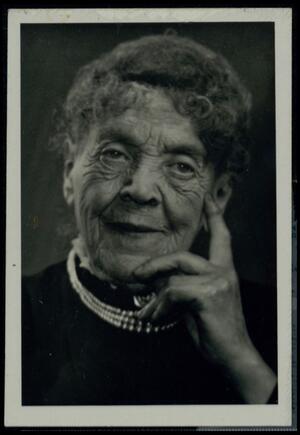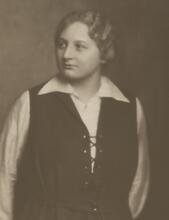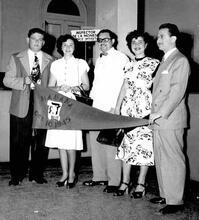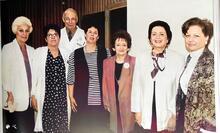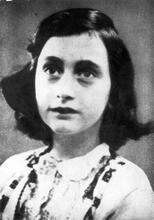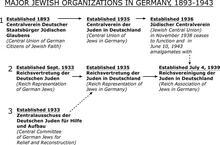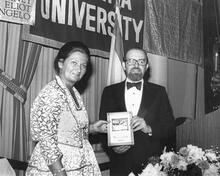Erna Patak
Born in Brno (Czech Republic), Erna (Ernestine) Patak was a social worker and one of the Zionist veterans in Vienna in the early twentieth century. In 1898 she was among the founders of the first Zionist women’s organization in Vienna and became the first president of WIZO Austria in the early 1920s. After the Anschluss in 1938, she refused to leave Austria because of her sick mother. In 1942, she was departed to Theresienstadt at the age of 71. She survived, and after liberation in 1945 she returned to Vienna and then moved to London in 1947. In 1949, she fulfilled a lifelong dream and immigrated to Israel, where she died in 1955.
Article
Erna (Ernestine) Patak was a social worker and one of the Zionist veterans in Vienna in the early twentieth century. She became the first president of WIZO Austria in the early 1920s. She survived Theresienstadt (Terezin) and moved to Tel Aviv in 1949.
She was born in Brno (Czech Republic) on November 4, 1871, to Adolf Eisenmann and Fani (née Kohnberger). The Eisenmann family were well-to-do merchants and Erna was brought up in a prosperous, assimilated atmosphere. In this environment, she met her husband, Sigmund Patak (1858–1932), a tobacco industrialist. They married on June 1, 1890, and as a result of her marriage she enjoyed financial independence. When the couple settled in Vienna in 1890, she engaged in social work like many other bourgeois Jewish women. On May 5, 1909, she divorced Sigmund. The couple had no children.
Already in her early twenties, Patak became interested in Zionism, establishing a close friendship with the Herzl family and other prominent Zionists, such as Alexander Marmorek (1865–1923), Isidor Schalit (1871–1953), and Robert Stricker (1879–1944). In 1898 she was among the founders of the first Zionist women’s organization in Vienna and became the first president of WIZO Austria in the early 1920s. Besides her Zionist activities, she increased her social involvement, running a rest home for the needy and a kindergarten. In 1907, following the financial difficulties of Theodor Herzl’s family, she took care of his daughter Pauline (1890–1930) in her rest home. During World War I she continued her work and was committed to Jewish refugees, cooperating with other Jewish women such as Anitta Müller-Cohen and Siegfried Bernfeld. At the same time, she engaged in such Zionist organizations as the Jewish National Fund (Keren Kayemet Le-Israel) and Keren Hayesod.
After the foundation of the Republic of Austria on November 12, 1918, when women received universal franchise in Austria, Erna Patak joined the Jewish-National Party of Robert Stricker in Vienna and ran for elections for parliament. As the president of WIZO Austria she was also involved in the Jewish women’s movement. She attended the first World Congress of Jewish Women in Vienna in 1923 and the third World Conference of Zionist Women in Vienna in 1925. In the late twenties and early thirties, she became an admirer of Vladimir Jabotinsky (1880–1940).
After the Anschluss on March 13, 1938, Erna Patak refused to leave Austria because of her sick mother. Under most difficult circumstances, she lived in Vienna until 1942, when she was deported to Theresienstadt at the age of 71. There she survived three years under horrible conditions. During those years, in Vienna and Theresienstadt, Sofie (1890-1981) and Josef Löwenherz (1884–1960), head of the Jewish community of Vienna, supported her by writing postcards and sending food parcels. After her liberation in 1945, she returned to Vienna, and then moved to her relatives in London in 1947.
A lifelong dream became true when Erna Patak immigrated to Israel in 1949. In honor of her Zionist services, the City Council of Tel Aviv provided her with a room in an old-age home. In her last years, she lived a quiet life, but remained faithful to WIZO and her old friends. Erna Patak died in Tel Aviv on April 19, 1955.
Selected Works
Patak, Erna. “The Strickers in Theresienstadt.” In Robert Stricker. Edited by Josef Fraenkel. London: 1950.
Various articles in the newspaper Wiener Morgenzeitung
WIZO in Israel, No. 64, Tel Aviv: May 1955.
Mitteilungsblatt des Irgun Olej Merkaz Europa, Tel Aviv: May 13, 1955.
Sternberger, Ilse. Princes Without a Home. Modern Zionism and the Strange Fate of Theodor Herzl’s Children, 1900–1945. San Francisco: International Scholars Publications, 1994.
Wallas, Armin. Eugen Hoeflich. Tagebücher 1915 bis 1927. Vienna: 1999.
Adunka, Evelyn. Exil in der Heimat. Über die Österreicher in Israel. Innsbruck: Studien Verlag, 2002.

